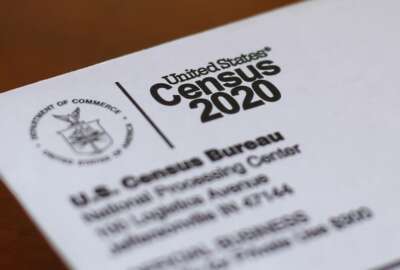
Longer tax-filing season means more fake tax returns for the IRS
In today's Federal Newscast, the longer tax-filing season means more fake tax returns for the IRS.
To listen to the Federal Newscast on your phone or mobile device, subscribe in PodcastOne or Apple Podcasts. The best listening experience on desktop can be found using Chrome, Firefox or Safari.
- The IRS is facing a spike in fraudulent tax returns during its extended filing season. The IRS tells the Treasury Inspector General for Tax Administration it’s seen more than seven times the volume of fraudulent tax returns compared to the same period last year. The agency flagged more than 30,000 suspicious tax returns worth more than $130 million. With the filing season now running through mid-July, TIGTA says will continue to monitor for backlogs in the agency’s response to tax help questions. (Department of the Treasury)
- The Thrift Savings Plan says it will stop sending automatic required minimum distribution payments this year. Participants don’t need to make any withdrawals from the TSP to satisfy a required minimum distribution. The TSP will withhold the appropriate amount of federal taxes for any withdrawals that participants do make. Retirees age 72 or older usually must withdraw a minimum amount from their accounts each year under typical rules. But the $2 trillion stimulus package relaxed those rules. (Thrift Savings Plan)
- The General Services Administration is cutting the time it takes to pay small business prime and subcontractors in half. GSA issued a memo yesterday explaining how it plans to get money to small firms in 15 days instead of 30 days as required by the Prompt Payment Act. The fiscal 2020 Defense authorization bill expanded the requirement to prime contractors, not just subcontractors. GSA says its developing a new policy for the Federal Acquisition Regulations so this class deviation will address the prompt payment issues in the short term.
- The Justice Department moves to protect a certain type of grim reaper from getting the deadly coronavirus. Justice’s U.S. Trustee Program undertakes several moves to protect those involved in bankruptcy proceedings. It stops 60,000 proceedings already scheduled and would have had lots of attendees. It orders all meetings occur online. Justice also suspends audits of chapter 7 and chapter 13 debtors because they require in-person discussions. And it notifies trustees to protect stimulus payments that debtors might receive. (Department of Justice)
- The Air Force entered into a new agreement to further institutionalize the agile approach to software development. The Air Force’s chief software office and Scaled Incorporated signed a memorandum of understanding creating a public private partnership to further the Defense Department’s move to dev/sec/ops. The organizations will figure out how to modify and tailor Scaled Inc’s Scaled Agile Framework to meet DoD’s current dev/sec/ops processes. Under the MOU, the Air Force and Scaled Inc. will identify a pathfinder program to develop the practices and approaches required to bring the framework into DoD. SAFe is used by 70 percent of the Fortune 100 companies and has trained 500,000 practitioners.
- The Air Force is also providing new package services to military families with special needs. The online portal will allow airmen and their family members to expedite prescreening and track important medical equipment starting April 15. The service is being provided as the military is clamping down on shipments to installations to control the spread of coronavirus. Some medical services are slower than usual because of employees working from home. The Air Force hopes the online portal will save some time for families with special needs.
- Coronavirus is showing some fault lines within the Coast Guard. Coast Guard Commandant Karl Schultz says the stress coronavirus is putting on the service’s IT infrastructure highlights the need for modernization. Earlier this year Schultz said the Coast Guard’s IT infrastructure is on the brink of catastrophe. Schultz says the service needs to increase its internet speeds, move to the cloud and become more mobile. The 2021 budget only allocates $24 million for IT modernization. The Coast Guard estimates it has a $300 million IT shortfall. (Federal News Network)
- Virtual mental health appointments at the Department of Veterans Affairs are on a dramatic rise during the pandemic. Online group therapy sessions for veterans were up 200% in March compared to the previous month. VA mental health providers used the agency’s Video Connect system for 34,000 virtual appointments in March. That’s a 70% increase over February. Mental health appointments over the phone are up 280%. VA is expanding telehealth services to prevent veterans from coming to its facilities during the pandemic.
- House Democrats have their own to-do list for the next coronavirus rescue bill. Two House Democrats say they have a long list of ideas for federal employees and contractors. The proposals came from House Oversight and Reform Committee Chairman Carolyn Maloney (D-NY..) and Subcommittee Chairman Gerry Connolly (D-Va.). They suggest allowing employees to make changes to their federal health insurance plans during the pandemic. They’re also recommending two-thousand dollars a month in child care subsidies for federal employees who have to come to work. Other proposals would clarify guidance for federal contractors. Maloney and Connolly say existing guidance has been inconsistently adopted. (Federal News Network)
- Two Democrats are proposing a bill of rights for essential workers during the coronavirus pandemic. Senator Elizabeth Warren (D-Mass.) and Congressman Ro Khanna (D-Calif.) say frontline employees need guaranteed safety protections and premium pay. They’re also suggesting child care subsidies for health and other employees working on the frontlines of the pandemic. And they’re looking for extra whistleblower protections for employees who reveal health and safety concerns at work. (Sen. Elizabeth Warren)
- The Defense Department will spend nearly half a billion dollars for equipment that can sanitize the masks health care workers need to treat coronavirus patients. The Defense Logistics Agency awarded a $415 million contract to Batelle for 60 machines that the company says can decontaminate N95 masks that have already been used. The idea is to station the equipment around the country, depending on where FEMA and HHS think they’re needed the most. DoD says the machines will be available by early May. At that point, they’ll be able to sterilize about 34 million masks per week.
- The Trump administration is seeking a four-month extension for a key deadline in the 2020 Census. Commerce Department and White House officials are asking Congress to give the Census Bureau until April 2021 to submit data on the final count to lawmakers and the president. That would allow the bureau to resume field operations in June, and complete its fieldwork by the end of this October. Under this new timeline, the bureau would send redistricting data to states by July 2021. (Federal News Network)
Copyright © 2025 Federal News Network. All rights reserved. This website is not intended for users located within the European Economic Area.
Eric White
Eric White is news anchor and Federal Drive producer at Federal News Network.
Follow @FEDERALNEWSCAST
Related Stories
Related Topics
2020 Census
All News
Batelle
Carolyn Maloney
Census Bureau
Covid-19
Defense Logistics Agency
Elizabeth Warren
Federal Acquisition Regulation
Federal Drive
Federal Newscast
FEMA
General Services Administration
Gerry Connolly
IRS
Justice Department
Karl Schultz
Management
prompt payment act
Ro Khanna
Treasury Department
Treasury Inspector General for Tax Administration





